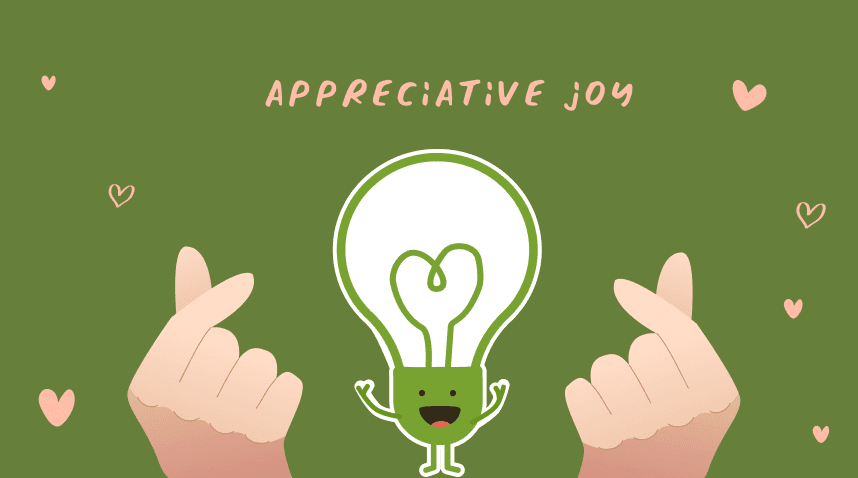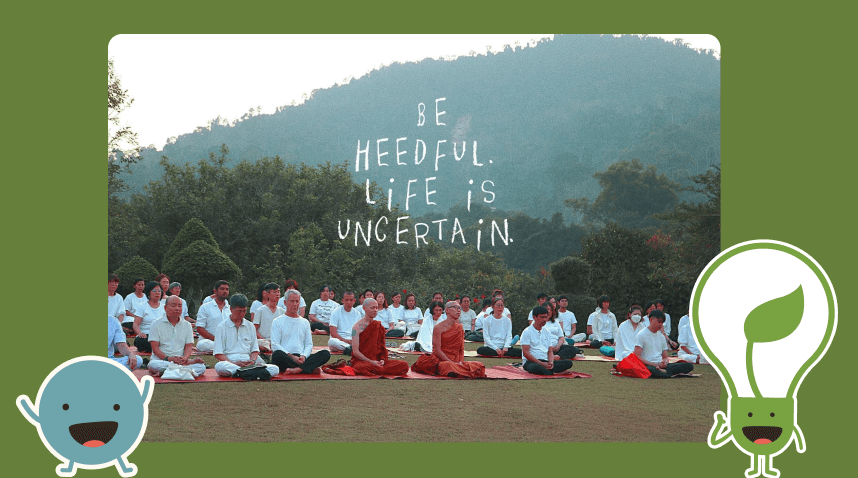TLDR: Cheryl shares her experience in attending a meditation retreat. She explores how she sought refuge from unsatisfactoriness, learned to understand and accept suffering as natural, and reduced conceit through mudita and gratitude.
From the 18th to 25th of February, I had the great opportunity to attend Ajahn Anan’s ( a renowned teacher from the Thai forest tradition) meditation retreat in person in Wat Marp Jan, Rayong, Thailand. Thankfully, the right conditions were present, such as having supportive health, work, and family conditions. Therefore, I was able to attend and complete the retreat as planned.
It is not uncommon that people full of faith in their hearts sign up, and make payments, but due to unexpected illnesses or personal matters, are unable to make it. Thus, I cherished the rare opportunity and sought to try my best in absorbing as much as I could from a teacher I respect and admire.
The routine and living conditions in the retreat were basic but were adequately comfortable. As a lay female devotee, you live in a shared two-floor dormitory with 50 other female retreatants, with no air-conditioning or private toilets. You rest on a thin mattress and a small block of cushion as a pillow to lay your head on.
The environment was void of any luxuries or excesses, providing a conducive environment to sustain and live simple lives as we spent 8 days practising the path of virtue, concentration, and wisdom.
The programme begins at 4:30 am, and consists of many hours of sitting and walking meditation, chanting sessions, 2 to 3 Dhamma talks and QnAs every day, communal chores, and the best part, one vegetarian meal a day.
As city-dwellers used to the 3Cs of Comfort, Convenience, and air-Conditioning, many of my colleagues and friends couldn’t hide their surprise. “Why put yourself through such ‘torture’?” is one of the many questions I got.
I guess what the question is really pointing to is: What are you searching for so desperately?
I was seeking refuge, to escape the chaos and hotness of the mind, swirling and spinning with the worldly winds of gain and loss, pain and pleasure, praise and blame, and fame and disrepute.
Here are 3 things I can only hope to summarise:
- Understanding unsatisfactoriness is not the same as having unsatisfactoriness
- There’s no “I” in total control over “my” body and mind.
- Reduce conceit through mudita and gratitude
Understanding unsatisfactoriness and looking it in the eye

Before the retreat, I was a total wreck. I was extremely anxious over the possibility of losing my job, my mental state and physical health were all out of whack due to personal matters.
One may say, with all of this chaos, that I am well acquainted with the Buddha’s first noble truth of suffering, and I thought so too. I was self-proclaimed to be an expert on suffering. “Life sucks, life is so painful,” I would lament to anyone who would care to listen.
I experienced immense suffering, but I was ignorant of the truth that suffering is an inevitable part of life—and a large part of my suffering accumulated because I did not want to suffer.
I did not want to be separated from what I loved, I did not want to be associated with what I disliked. By fighting the experience of dukkha, unknowingly, I was just deepening my suffering and creating conditions for more suffering to arise.
As the Buddha said in SN 56.11,
“Birth is suffering, aging is suffering, death is suffering; sorrow, lamentation, pain, distress, & despair are suffering; association with what is not loved is suffering, separation from what is loved is suffering, not getting what is wanted is suffering. In short, the five clinging aggregates are dukkha. Stress should be known.
The cause by which stress comes into play should be known. The diversity in stress should be known. The result of stress should be known. The cessation of stress should be known. The path of practice for the cessation of stress should be known.”
Learning this noble truth helped me soften my attitude towards suffering. As many wise monks often say, “When one experiences happiness, it’s just like this; When one experiences sadness, it’s just like this.”
Instead of grasping tightly to the experience of suffering as mine and as something that “I should deal with” or “I should not have”, I observe the experience as something that arises, stays for a little while, and ceases. Just as fire needs the conditions of heat, oxygen, and fuel to arise, as long as the mind is still conditioned by greed, hatred, and delusion, suffering will still arise.
And the practice was to accept that the experience of a constricted mind wanting freedom is just like this, the pain of clinging is just like this, the unreasonable demands of craving are just like this, and to patiently endure till the experience ceases accordingly.
Thankfully, nothing ever stays forever and the longest a sensation lasted was 6 breaths, before the suffering ceased on its own.
In accepting suffering as something natural, and an experience that arises due to causes and conditions, I also learn to have more compassion towards myself.
Just as how one would sympathise and care for a toddler who is learning to walk and keeps falling over many times, I am reminded by the wise words of Ajahn Achalo to not underestimate the power of our negative habitual tendencies and mental afflictions, and be forgiving to ourselves as we stumble and falter in the journey.
You would not berate the toddler for falling down as he learns to walk, so do not berate yourself as you make mistakes or have unwholesome thoughts.
And lastly, understanding that Dukkha is an inevitable experience of the human condition also expands the compassion to all beings.
Regardless of whether one is clothed in Gucci or in tattered rags, living in a huge mansion or a tiny hut, everyone will have to experience the same burdens of birth, ageing, and death; of sorrow, lamentation, pain, distress, and despair; of association with what is not loved, of separation from what is loved, and of not getting what is wanted.
Thus, let’s be unconditional in our compassion for fellow compatriots in old age and sickness.
There’s no “I” in total control over “my” body and mind
Anatta is the concept of non-self, which teaches that there is no permanent, unchanging entity within an individual. In the Anatta-lakhana Sutta, Buddha addressed the group of five and shared:
“Monks, form is not-self. Were form self, then this form would not lead to affliction, and one could have it of form: ‘Let my form be thus, let my form be not thus.’ And since form is not-self, so it leads to affliction, and none can have it of form: ‘Let my form be thus, let my form be not thus.’
The process of contemplating my mind and body was truly humbling as I had to surrender to the fact that there is a complete lack of control in shielding my body from afflictions no matter how much I tried. As much as I try to keep healthy and maintain hygiene, my body still falls ill and deteriorates and experience pain/sickness in almost every part.
Think of the hair of the head, hair of the body, nails, skin, teeth. Have you not experienced blisters, cuts, itches and aches, falling off and bleeding in these areas?
And if the body was truly mine, why was I not able to avoid feeling painful sensations? If the body was truly self, wouldn’t I be able to stop a cough or sneeze and be less disruptive in the Dhamma talks?
But alas, the body is not mine to control, not something I own, and is merely a machine just reacting to causes and conditions, deteriorating every day till it ceases to function anymore.
Likewise, if the mind was truly mine to control, shouldn’t I be able to control my thoughts and feelings and not be distracted when I didn’t want to?
My life has always been geared towards creating a stronger sense of control by getting what I want. With this delusion, the mind was constantly in this agitated state of wanting more and more pleasure, excitement, and enjoyment, but the craving is never ever satisfied. Oddly, the more I had, the more I wanted. Craving is not fulfilled through satisfying it.
Letting go of the sense that I had to be in full control for even just a tiny moment felt so liberating because I can just rest in a content mind, and be at ease with the present moment. The mind can finally stop chasing, and this letting go leads to the heart feeling full. Thus, contemplating on how little control one has over your mind and body can be a skillful means to bring the restless mind to stillness.
Furthermore, understanding how little control I have has also enlightened me about my own mortality. Perhaps I could die by mid-morning, perhaps I could die in the afternoon, perhaps I could die at night. Life is uncertain, and we will never know when or how we will die, but death will certainly reach us.
As one who may be intoxicated by our youth, health, and life, the idea of a near-death may seem improbable, but no one can confidently say for a fact that it is impossible.
This reflection on death also brings about energy when the mind is slacking in sloth and torpor, distracted in restless thoughts, anxiety, or sensual desires. It can therefore be also used as a skilful means for contemplation.
Practice Mudita and gratitude to reduce conceit

In the Sona Sutta, the Buddha speaks to the householder Sona regarding conceit.
“If one regards himself superior or equal or inferior because of the body, [likewise ‘feeling,’ ‘perception,’ ‘mental formations,’ ‘consciousness’] that is impermanent, painful and subject to change, what else is it than not seeing things as they really are? But, Sona, whatever recluses and Brahmans do not hold such views… What else are they but those who see things as they really are?”
Due to the conditioning of ignorance present in my mind, and the mind still clinging firmly to my five aggregates, the proliferation of conceit always arose in my mind.
As I walk, thoughts screaming for attention will go “Look at me, look at me! I’m better than them!” and then in the same vein, it will swing to the far end. “Oh my god,but I am worse than xxx!” and then sometimes “Ok lah, at least we same same!”
It was fascinating to observe how the mind see-saws endlessly between feeling pretty good about itself, to becoming awfully self-loathing and stricken with anxiety. It is painful, yet almost absurdly comedic. Ajahn Anan describes this sense of self as the “us-them” or “me-you” narrative that goes on and on and on, creating so much Dukkha along the way if left unchecked.
What I found helpful was to bring up the wholesome mindstates of appreciative joy. As Buddhists, we often use the term “Sadhu”, which means to rejoice or say “well done!” But how many of us actually take the time to truly appreciate how rare it is for another person to be walking on the Noble Eightfold Path, or appreciate how much goodness may arise from one seeing the importance of doing good, practising virtue, and purifying the mind?
Sadhu for me has always been a ritual, something you do because everyone around you says it. However, the teachers kindly reminded us to not underestimate it but to bring it up to the forefront of our mind constantly.
In practising appreciative joy, I find that rejoicing in the good deeds and success of others not only uplifts and lightens the mind, but it also reduces the unwholesome qualities of greed in the mind. I stop needing to put others down to feel better about myself, and simply feel better in the happiness others experience from getting what they want or enjoying the fruits of their labour.
Ajahn Achalo half-jokingly puts it, “It’s the easiest way to gain merit without putting in all the hard work!”
Similarly, practising gratitude is also immensely helpful to move the mind from a place of conceit to humility. Whenever thoughts of conceit arise, such as “my wisdom is superior,” “my body is equal”, “my meditation is inferior”, I recall all the people I am thankful for.
This reminds me that what I perceive to be mine are merely the byproducts of the generosity, wisdom, and compassion of so many people around me, as well as the Buddha, the Dhamma, and the Sangha.
Without all these, what I proudly claim to be “mine” would have never even existed. What is experienced as “mine” is merely a ripening of kamma stitched together by various causes and conditions. Thus, this serves as a reminder for me to be heedful of speech, thoughts, and actions, as I will be the owner and heir of the kamma ripening, be it wholesome or unwholesome.
In conclusion
The retreat was a deeply challenging yet transformative one, and the end of it is only the start of a commitment to a life-long practice. As the bus journeys from the monastery compound into the “real world”, it is important to recollect that time also does not pause as we journey one second at a time into old age, sickness, and death. So, make the best use of our limited time here to do good, avoid evil, and purify the mind.
Wise Steps:
- Whenever you are suffering, take a deep breath and use the mantra “It’s just like this.” to remind you to stop resisting the experience.
- Contemplate the body as not a “self” I can control, not a “mine” I own.
- Keep a gratitude log and genuinely rejoice in another person’s virtue and success.


